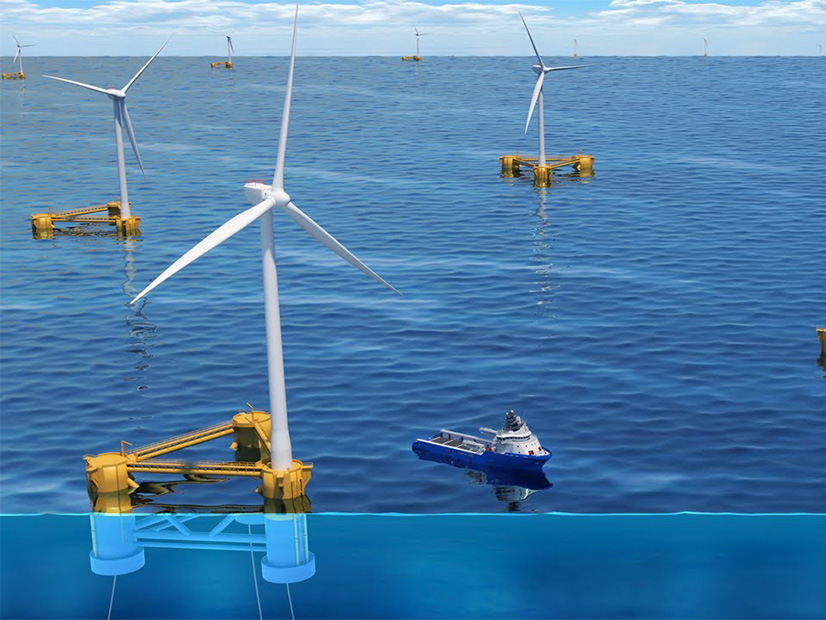
In a move expected to boost offshore wind development, the California legislature has passed a bill that would give the state authority to buy certain types of clean energy.
Assembly Bill 1373, by Assemblyman Eduardo Garcia (D), was passed late Thursday, the final day of the legislative session. Gov. Gavin Newsom has until Oct. 14 to sign it.
Under AB 1373, the state Department of Water Resources would be authorized to buy clean energy if the California Public Utilities Commission determines additional clean energy resources are needed to meet the state’s renewable energy goals.
Earlier versions of the bill referred specifically to procurement of offshore wind and geothermal resources. The final version of the bill replaced mentions of offshore wind and geothermal energy with “eligible energy resources.”
Those are resources that don’t use fossil fuels or combustion to generate electricity and that have a lead time of at least five years for development and construction. In addition, the CPUC would make sure load-serving entities aren’t planning to buy substantial amounts of the resource.
“Having DWR be able to buy these resources when our utilities haven’t been able to or have chosen not to is the cheapest and most efficient way to get these needed resources online,” Garcia said during a Sept. 6 meeting of the Senate Energy, Utilities and Communications Committee.
The DWR’s procurement authority would expire in 2035. As an urgency statute, the bill would take effect immediately, and a two-thirds vote was required to pass it.
The Senate also amended the bill to include a provision intended to facilitate development of transmission needed to tap the resources being procured.
“This bill would require the PUC, in a proceeding evaluating the issuance of a certificate of public convenience and necessity for a proposed transmission project, to establish a rebuttable presumption with regard to need for the proposed transmission project in favor of an Independent System Operator governing board-approved need evaluation if specified requirements are satisfied,” the provision states.
Unlocking Investment
The American Clean Power Association and other groups supporting AB 1373 said in a letter to lawmakers that the bill would provide market certainty “at a time when offshore wind developers are evaluating whether and how to make the next major investments in project development.”
On Friday, offshore wind industry groups applauded the bill’s passage.
Adam Stern, executive director of Offshore Wind California, called AB 1373 “an important milestone” that will “provide a clear path to market for large-scale clean energies like offshore wind.”
“Passage of this legislation shows California is serious about going big on offshore wind and positioning itself as a leader and global hub of this important clean energy resource,” Stern said in a statement.
The Business Network for Offshore Wind called the bill “key to unlocking new investments.”
“This new procurement authority is essential to unlocking the billions in new investments needed for port redevelopments, vessels, supply chain expansions and manufacturing facilities,” Liz Burdock, the network’s founder and CEO, said in a statement Friday.
Lawmakers who opposed AB 1373 included Sen. Brian Dahle (R), who noted that biomass, hydrogen and carbon capture technologies would be excluded from state procurement.
Dahle was also concerned about the impact to ratepayers of the state’s energy procurement.
“Every single ratepayer in California is going to pay,” Dahle said during the Sept. 6 committee hearing.
Garcia noted that utilities would still be able to buy energy from sources such as biomass.
Clean Energy Goals
AB 1373 is seen as a way to help meet California’s clean energy goals while maintaining grid reliability. The state has set a target for all retail sales of electricity to California customers to come from renewable and zero-carbon resources by the end of 2045.
Last year, the California Energy Commission adopted the nation’s most ambitious long-term offshore wind goals, targeting a buildout of up to 5 GW by 2030 and 25 GW by 2045. (See Calif. Adopts Country’s Most Ambitious OSW Targets.)
In December, the West Coast’s first offshore wind auction brought in $757.1 million for five lease areas off the California coast. (See First West Coast Offshore Wind Auction Fetches $757M.)
In an initial proposal early this year, Gov. Gavin Newsom proposed giving the state authority for procurement of wide-ranging types of energy. The idea sparked concerns from some utilities about competing with the state for buying energy, and the legislature revised the proposal to narrow down the type of energy the state could procure.
On Aug. 31, the governor announced he had reached an agreement with the legislature on the bill.
“This legislation will help us achieve a 100% clean electric grid and phase out the very pollution that causes extreme weather in the first place,” Newsom said in a statement. “We’re taking action to build the clean energy we need, faster.”



